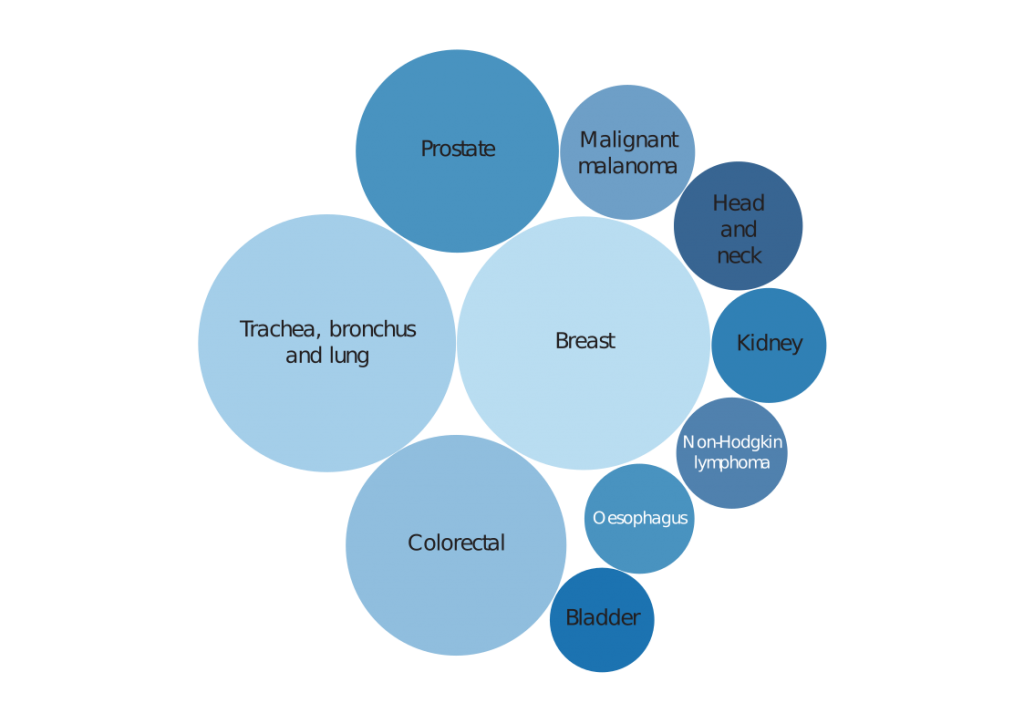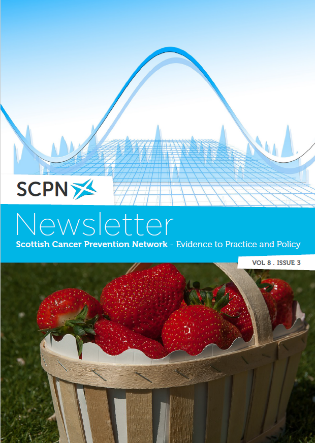
Cancer Incidence in Scotland

19 Aug 17 |
Andrew Deas and Greig Stanners, Information Services Division, NHS National Services Scotland
The Scottish Cancer Registry has collected data on cancer since 1958. The data are used for a wide variety of purposes including research and planning of cancer services. The data are also used in the annual publication of cancer incidence statistics for Scotland. This article summarises the key points
of the April 2017 publication, which includes data on incidence to 2015.
In 2015, 31,467 people were diagnosed with cancer (16,266 females and 15,201 males). This was an increase from 27,494 people ten years previously. Much of this increase can be explained by the ageing population of Scotland and the fact that most major types of cancer are more common in older people.
The age-adjusted incidence rate for cancer allows you to make a fairer comparison over time. The rate increased by 5% over the last ten years for females and decreased by 4% for males.
However, when looking at different types of cancer, there was considerable variation in incidence trends. For instance, over the last ten years, the
incidence rate for malignant melanoma of the skin increased by 33% in males and 10% in females. In contrast, the rate for ovarian cancer decreased by 13% over the same period.

Most common cancers in Scotland, 2015. All persons.
Lung cancer was the most common type of cancer diagnosed in Scotland, with 4,997 new cases in 2015. Other common cancers were breast cancer
(4,762 cases), colorectal cancer (3,671 cases) and prostate cancer (3,091 cases). These four types of cancer accounted for over 50% of new cancers
in Scotland in 2015.
It is also possible to estimate the number of people who have been diagnosed with cancer over the last 20 years and who were still alive at the end of
2015 (prevalence). For all cancers, the prevalence estimate was approximately 186,500 people or around 3% of the population of Scotland. This will include people who are currently being treated for cancer as well as people who were diagnosed many years ago and completed their treatment.
Finally, the lifetime risk of being diagnosed with cancer can be calculated. It is estimated that two in five people will be diagnosed with cancer during their lifetime. This will also include some cancers that may have no detrimental impact on life expectancy, such as slow-growing prostate tumours.
It is also important to bear in mind that the estimate is based on existing trends for the whole population. For individuals, the risk of developing cancer will be affected by lifestyle, genetics and environmental factors.
Further Information
The publication is available on the ISD website: http://www.isdscotland.org/Health-Topics/Cancer/Publications.
Acknowledgement
Our publication uses data shared by patients and collected by the NHS as part of their care and support.
This article was originally published in The SCPN Newsletter Volume 8, Issue 3. Read the digital newsletter below using Issuu, or feel free to download the PDF.
View the PDF
The SCPN Newsletter: Volume 8, Issue 3
In this issue: Achieving a tobacco-free generation by 2034 and improving the reach of Scotland’s cancer screening programmes are among the topics covered in Volume 8, Issue 3. In the science section we have the CUP report on Diet, Nutrition, Physical Activity and Breast Cancer from World Cancer Research Fund, cancer incidence in Scotland and the latest cancer and lifestyle research roundup. We also have a recipe for watermelon and tomato breakfast salad to break things up!